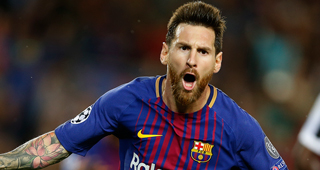It’s fitting that Leo Messi should come on from the bench and score the game-winning goal—the only goal Barcelona would score all match—to win the league for them against a Levante side the rest of the bunch should have put away easily. There is almost nothing Messi can’t do, but the specific thing he does most frequently these days is rescue his team. He may not play great all the time, or he might only play for half an hour. Sometimes it seems like he hardly runs. No matter the shape of the performance, it is more often than not decisive. Among a hundred other laudable traits, the Argentine’s got a keen sense of timing.
Messi was supposed to be resting on Saturday, with La Liga all but won and an important Champions League match against Liverpool on the horizon, but this Barcelona team don’t grant him much rest. Ernesto Valverde is a sharp manager who has built within the spine of his team a stronger defensive solidity than they possessed under either Luis Enrique or Tata Martino, but he’s not a man with a lot of exciting ideas in the attacking third, deferring mostly to the considerable genius of his players. Thought this should work in theory given the immense amount of resources Barcelona have poured into their midfield and front lines over the past few seasons, the mechanism hums like it should with curious irregularity.
Luis Suárez is the not the fearsome and prolific attacker he used to be. While he’s still capable of the sublime, he’s also prone to giving the ball away and blasting relatively easy chances wide of the post. Ousmane Dembele is developing into a terrifying winger, but while his individual talent is obvious, he’s still learning to harmonize within the flow of the attack. He can flummox three defenders all by himself, but he’ll unlock his full potential only once he figures out how to let his teammates do more of the work for him.
Ivan Rakitić is getting a little long in the tooth, and as typically happens with midfielders as their athleticism diminishes, he’s more static in attack because he doesn’t want to get caught out of position on the break. Philippe Coutinho simply isn’t the same player he was at Liverpool. His touches are off; his understanding with his teammates is frequently nonexistent. Some combination of pressure and circumstance have brought him low, and he might be on his way out of the club this summer.
This isn’t to say Barcelona’s squad isn’t well-stocked, or that they don’t attack well, but they’re prone to long spells of aimless passing that end with hopeful strikes from outside the box or combination play that’s easily swallowed up by clustering defenders. They’re still dominant in nearly every match because they control possession well and dictate the past of the game. It’s just that they’ll spend 40, 60, 80 minutes creating nothing more than a chance or two. They’re difficult to play against, but seldom as outright obliterative as they were at the height of Pep Guardiola’s tenure, when they melted opponents like candle wax, or their one truly awesome year under Luis Enrique, when Suárez, Neymar, and Messi flattened everything in their path.
Every criticism of Barcelona is a matter of parsing degrees. They’ve won La Liga fairly easily, but it’s been a strange year in Spain. Both Atlético Madrid and Real Madrid have underachieved. (Los Blancos have been a downright mess since exiting the Champions League.) The middle of the table is packed with pretty good teams, but “pretty good” will still get you beat 3-1 at Camp Nou. You couldn’t say with a straight face that Barcelona have struggled. By the numbers, they’ve been soaring.
Yet they’re clearly not operating at full capacity. For a squad with arguably as much talent as any in the world, they still lean so heavily on Messi. He’s tied the score or put Barcelona ahead on 16 different occasions in Spain this season. Against Sevilla in February, he did it three times in one match: he drew Barça level at 1-1, then at 2-2, then put them up for good in the 85th minute. When Barcelona are in trouble, he takes the ball and cuts from right to left, cuts from right to left, cuts from right to left—until he finds somebody to pass to or a narrow shooting lane.
There’s not much arguing with this strategy. It clearly works, or at least it has until now. With La Liga out of the way, the Champions League will function as a more stringent test of just how good Barcelona are and the limits of how far Messi can carry them. The answer in all likelihood is that he can win the whole thing for them. But there are easier ways of getting there, and Liverpool are a stronger side than any they’ve faced domestically this year. It remains to be seen on Wednesday whether they’ll force Barça become something more or fall to the same tactic that’s scythed through the rest of Spain. It’s also quite possible Liverpool will contain them and score a couple goals of their own. There is no full accounting for Messi, but the players around him—they can be found out more easily than Barcelona’s record suggests.



